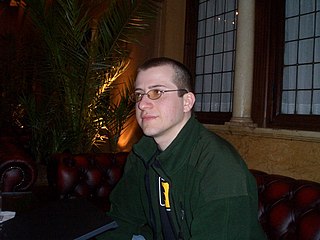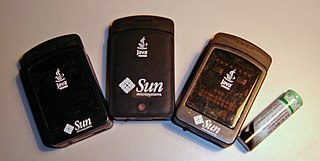Related Research Articles
The World Wide Web Consortium (W3C) is the main international standards organization for the World Wide Web. Founded in 1994 and led by Tim Berners-Lee, the consortium is made up of member organizations that maintain full-time staff working together in the development of standards for the World Wide Web. As of 5 March 2023, W3C had 462 members. W3C also engages in education and outreach, develops software and serves as an open forum for discussion about the Web.

Jon Lech Johansen, also known as DVD Jon, is a Norwegian programmer who has worked on reverse engineering data formats. He wrote the DeCSS software, which decodes the Content Scramble System used for DVD licensing enforcement. Johansen is a self-trained software engineer, who quit high school during his first year to spend more time with the DeCSS case. He moved to the United States and worked as a software engineer from October 2005 until November 2006. He then moved to Norway but moved back to the United States in June 2007.

Cory Efram Doctorow is a Canadian-British blogger, journalist, and science fiction author who served as co-editor of the blog Boing Boing. He is an activist in favour of liberalising copyright laws and a proponent of the Creative Commons organization, using some of its licences for his books. Some common themes of his work include digital rights management, file sharing, and post-scarcity economics.
Free Java implementations are software projects that implement Oracle's Java technologies and are distributed under free software licences, making them free software. Sun released most of its Java source code as free software in May 2007, so it can now almost be considered a free Java implementation. Java implementations include compilers, runtimes, class libraries, etc. Advocates of free and open source software refer to free or open source Java virtual machine software as free runtimes or free Java runtimes.

OpenSolaris is a discontinued open-source computer operating system based on Solaris and created by Sun Microsystems. It was also, perhaps confusingly, the name of a project initiated by Sun to build a developer and user community around the eponymous operating system software.
Visual J++ is Microsoft's discontinued implementation of Java. Syntax, keywords, and grammatical conventions were the same as Java's. It was introduced in 1996 and discontinued in January 2004, replaced to a certain extent by J# and C#.
The Open Media Commons, sometimes referred to as the Open Media Commons initiative, is a computer industry group whose goal is to "develop open, royalty-free digital rights management and codec solutions". One of their largest supporters is Sun Microsystems, who released their internal digital rights management (DRM) project, Project DReaM, as part of the Open Media Commons initiative on 22 August 2005.

GlassFish is an open-source Jakarta EE platform application server project started by Sun Microsystems, then sponsored by Oracle Corporation, and now living at the Eclipse Foundation and supported by Payara, Oracle and Red Hat. The supported version under Oracle was called Oracle GlassFish Server. GlassFish is free software and was initially dual-licensed under two free software licences: the Common Development and Distribution License (CDDL) and the GNU General Public License (GPL) with the Classpath exception. After having been transferred to Eclipse, GlassFish remained dual-licensed, but the CDDL license was replaced by the Eclipse Public License (EPL).

Benjamin Mako Hill is a free software activist, hacker, author, and professor. He is a contributor and free software developer as part of the Debian and Ubuntu projects as well as the co-author of three technical manuals on the subject, Debian GNU/Linux 3.1 Bible, The Official Ubuntu Server Book, and The Official Ubuntu Book.

Windows CardSpace is a discontinued identity selector app by Microsoft. It stores references to digital identities of the users, presenting them as visual information cards. CardSpace provides a consistent UI designed to help people to easily and securely use these identities in applications and web sites where they are accepted. Resistance to phishing attacks and adherence to Kim Cameron's "7 Laws of Identity" were goals in its design.

Sun SPOT was a sensor node for a wireless sensor network developed by Sun Microsystems announced in 2007. The device used the IEEE 802.15.4 standard for its networking, and unlike other available sensor nodes, used the Squawk Java virtual machine.

Java is a set of computer software and specifications that provides a software platform for developing application software and deploying it in a cross-platform computing environment. Java is used in a wide variety of computing platforms from embedded devices and mobile phones to enterprise servers and supercomputers. Java applets, which are less common than standalone Java applications, were commonly run in secure, sandboxed environments to provide many features of native applications through being embedded in HTML pages.
Web Services Interoperability Technology (WSIT) is an open-source project started by Sun Microsystems to develop the next-generation of Web service technologies. It provides interoperability between Java Web Services and Microsoft's Windows Communication Foundation (WCF).
OpenJDK is a free and open-source implementation of the Java Platform, Standard Edition. It is the result of an effort Sun Microsystems began in 2006. The implementation is licensed under the GPL-2.0-only with a linking exception. Were it not for the GPL linking exception, components that linked to the Java Class Library would be subject to the terms of the GPL license. OpenJDK is the official reference implementation of Java SE since version 7.
The Java Class Library (JCL) is a set of dynamically loadable libraries that Java Virtual Machine (JVM) languages can call at run time. Because the Java Platform is not dependent on a specific operating system, applications cannot rely on any of the platform-native libraries. Instead, the Java Platform provides a comprehensive set of standard class libraries, containing the functions common to modern operating systems.
IcedTea is a build and integration project for OpenJDK launched by Red Hat in June 2007. IcedTea also includes some addon libraries: IcedTea-Web is a free software implementation of Java Web Start and the Java web browser applet plugin. IcedTea-Sound is a collection of plugins for the Java sound subsystem, including the PulseAudio provider which used to be included with IcedTea. The Free Software Foundation recommends that all Java programmers use IcedTea as their development environment.

Meredith L. Patterson is an American technologist, science fiction writer, and journalist. She has spoken at numerous industry conferences on a wide range of topics. She is also a blogger and software developer, and a leading figure in the biopunk movement.
Digital rights management (DRM) is the management of legal access to digital content. Various tools or technological protection measures (TPM) like access control technologies, can restrict the use of proprietary hardware and copyrighted works. DRM technologies govern the use, modification and distribution of copyrighted works and of systems that enforce these policies within devices. DRM technologies include licensing agreements and encryption.
Encrypted Media Extensions (EME) is a W3C specification for providing a communication channel between web browsers and the Content Decryption Module (CDM) software which implements digital rights management (DRM). This allows the use of HTML5 video to play back DRM-wrapped content such as streaming video services without the use of heavy third-party media plugins like Adobe Flash or Microsoft Silverlight. The use of a third-party key management system may be required, depending on whether the publisher chooses to scramble the keys.
GNU LibreJS, or simply LibreJS, is a free software web browser extension for Mozilla Firefox-based browsers, written by the GNU Project. Its purpose is to block nonfree nontrivial JavaScript programs and allow free or trivial JS in a user's web browser. The add-on was written to address the so-called "JavaScript Trap" first described by Richard Stallman in 2009, a situation in which many users unknowingly run proprietary software in their web browsers.
References
- 1 2 Sun Microsystems President Jonathan Schwartz Shares Project DReaM
- ↑ Douglas, David; Papadopoulos, Greg; Boutelle, John (2009-08-24). "Chapter 16 Footnotes". Citizen Engineer: A Handbook for Socially Responsible Engineering. Pearson Education. ISBN 9780137044665.
- ↑ Sommar, Tomas (2011). DRM Interoperability and DLNA Devices (PDF) (Thesis). Stockholm: Royal Institute of Technology. p. 29. ISSN 1653-5715. Archived (PDF) from the original on 2013-07-30. Retrieved 2015-04-09.
- 1 2 Bobowicz, John (2005-08-21). "Open Media Commons turns the tables on DRM". Java.net . Oracle Corporation. Archived from the original on 2015-04-04. Retrieved 2015-04-04.
- ↑ Ng, Kia (2007-10-31). "Online Music Distribution". Interactive Multimedia Music Technologies. IGI Global. p. 351. ISBN 9781599041520.
- ↑ Garg, Sachin (2005-08-22). "Sun Announces Open-Source DRM Project". The Data Compression News Blog. Archived from the original on 2006-02-14. Retrieved 2015-04-04.
- ↑ dream: [ permanent dead link ]
- ↑ Khadraoui, Djamel (2007-05-31). "From DRM to Enterprise Rights and Policy Management". Advances in Enterprise Information Technology Security. IGI Global. p. 178. ISBN 9781599040929.
- ↑ Doctorow, Cory (2006-04-14). "How Sun's "open DRM" dooms them and all they touch". Boing Boing . Happy Mutants. Archived from the original on 2011-04-02. Retrieved 2014-04-04.
- ↑ Linksvayer, Mike (2008-02-28). "Is it possible to design non-defective DRM?". Creative Commons. Archived from the original on 2014-04-14. Retrieved 2015-04-09.